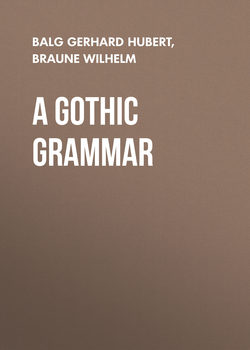Читать книгу A Gothic Grammar - Braune Wilhelm - Страница 27
INFLECTION
CHAP. II. DECLENSION OF ADJECTIVS
D. COMPARISON OF ADJECTIVS
Оглавление1. COMPARATIV
§ 135. The comparativ degree of adjectivs in Gothic is formd by means of two suffixes, -iz- and -ôz-, to which the terminations of the weak adjectivs ar added.
The formation with the suff. -iz- is more general than the other. It is found in adjs. of all kinds; e. g., managiza (< manags, a-stem), alþiza (< alþeis, §§ 127. 128), hardiza (< hardus, § 131). – But the suffix -ôz- occurs in a-stems only: frôdôza (< frôþs), swinþôza (< swinþs).
Note. The adj. juggs, yung, has the compar. jûhiza (according to § 50, n. 1). Its superlativ is not extant.
§ 136. The comparativs inflect exactly like weak adjectivs, but the f. ends in -ei (§ 132, n. 4):
etc., like the prs. ptc. (§ 133).
2. SUPERLATIV
§ 137. The superlativ degree, like the comparativ, is formd in two ways, in -ist- or in -ôst-; e. g., managists (< manags), armôsts (< arms, poor). The inflection of the superlativs is precisely the same as that of ordinary adjectivs – strong and weak.
Note. No rule can be givn for the appearance of the ô or the i in the suffix, except that the ô-form occurs only with a-stems. We may suppose that a word which forms the compar. by means of i, has i in the superl. also, and that, in like manner, the ô-forms correspond to each other. This supposition, however, is only founded on a few extant exampls.
3. IRREGULAR COMPARISON
§ 138. The lack of comparison of sum adjectivs is supplied by comparativs and superlativs with a corresponding meaning, but without a positiv:
§ 139. A superlativ with an m-suffix is found in six words, which ar derived from adverbial stems and appear without a positiv. The m-suffix is either simpl: fru-ma, innu-ma, aúhu-ma, or compound: af-tuma, if-tuma, hlei-duma.
Two of them hav assumed a comparativ meaning: aúhuma, higher; hleiduma, left (ἀριστερός); the others hav a superlativ or an intensiv signification: aftuma, the last; iftuma, the next; innuma, the inmost; fruma, the first.
These words follow the weak inflection, but hav the f. in -ei, exactly like the comparativs.
Note. Sum superlativs in -ma ar compared anew in the uzual manner: aftumists, the last; aúhumists, oftener than aúhmists (cp. OE. ŷmest, Sievers-Cook, OE. Gr., § 314, n. 3), the highest; frumists, the first. – The forms hindumists, hindmost, spêdumists, last (< *spêþs, beside spêdiza, spêdists), suggest the missing hinduma and spêduma. Also miduma, midst, midumônds, mediator, point to a form *miduma, midl (cp. OE. meodume, midmest).
